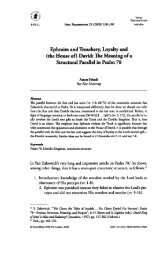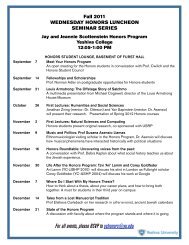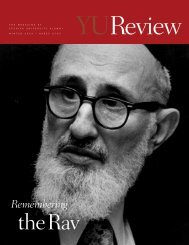Richard Steiner, Kol Nidre - Yeshiva University Blogs
Richard Steiner, Kol Nidre - Yeshiva University Blogs
Richard Steiner, Kol Nidre - Yeshiva University Blogs
You also want an ePaper? Increase the reach of your titles
YUMPU automatically turns print PDFs into web optimized ePapers that Google loves.
<strong>Kol</strong> <strong>Nidre</strong>: Past, Present and Future45was about which version of <strong>Kol</strong> <strong>Nidre</strong> to recite—not about whether torecite it at all.The halakhic problems inherent in <strong>Kol</strong> <strong>Nidre</strong> led R. Meir b. Samuelof Ramerupt, the father of Rabbenu Tam, to revise the text so that itreferred to the vows of the coming year instead of the vows of the pastyear. The revision (inspired by the Talmud and possibly one or twogeonic responsa as well) was accomplished through the substitution ofa single word, replacing שעבר (“from last Yom Kippur to the one thatis coming”) with זה (“from this Yom Kippur to the one that iscoming”). This change, however, created a linguistic problem thatsurvives in many editions of the maḥzor down to the present day. Theemended temporal phrase refers to the future, but it modifies verbs inthe past tense ודאשתבענא ודאחרמנא ודאסרנא) a—(דנדרנא blatantinternal contradiction.According to many reports, Rabbenu Tam (if not his father) solvedthe problem in a remarkably elegant and inconspicuous manner. In therevised version, the subtle replacement of שעבר with זה wasaccompanied by an even more subtle replacement of shewa and ḥaṭafpataḥ נְ דַ רְ נָא) “we have vowed,” אֲ סַ רְ נָא “we have bound”) with qametz“I shall bind”) in two of the verbs. The אָסַ רְ נָא vow,” “I shall נָדַ רְ נָא)חֲ רַ מְ נָא/אַחֲ רִ ימְ נָא subtle: treatment of the other two verbs was equally“we have pledged” and אִ שְׁ תְּ בַ עְ נָא “we have sworn” appear to havebeen replaced with חָ רִ ימְ נָא/מַ חֲ רִ ימְ נָא 150 I“ shall pledge” and מִ שְׁ תְּ בַ עְ נָא I“shall swear,” respectively. In all four cases, the perfect is replaced notwith the expected imperfect but with the participle (which often refersto the future in Late Aramaic) plus enclitic אנא < - נא “I.”For the fifth verb in <strong>Kol</strong> <strong>Nidre</strong>, אִ תְ חָ רַ טְ נָא/אִ יחָ רַ טְ נָא “we haveregretted,” three different emendations are recorded in our sources: (1)“if I shall טְ נָא (2) Rashi), “I shall regret” (attributed to אִ יחָ רַ טregret” (attributed to Rabbenu Meir), and (3) מִ תְ חָ רַ טְ נָא “I shall/herebyregret” (attributed to Rabbenu Tam, based on the analogy of hisemendation of שְׁ תְּ בַ עְ נָא .(אִ The form יחָ רַ ט ,אִ preserved in the earliestextant manuscript of Liqquṭe ha-Pardes, is of great interest. It raisesthe possibility that Rashi had his own prospective version of <strong>Kol</strong><strong>Nidre</strong> that was lost to posterity, supplanted by the version of his sonin-lawand grandson. Although copyists have tended to obliteraterevisions of <strong>Kol</strong> <strong>Nidre</strong>, a few clues remain in the manuscript—enoughto allow for a conjectural reconstruction.דְּ אִ י־חָ רִ (י)150For א חֲ רַ מְ נָ and רִ ימְ נָא ,חָ the qal perfect and participle respectively, see n. 88above.http://www.biu.ac.il/JS/JSIJ/12-2013/<strong>Steiner</strong>.pdf







